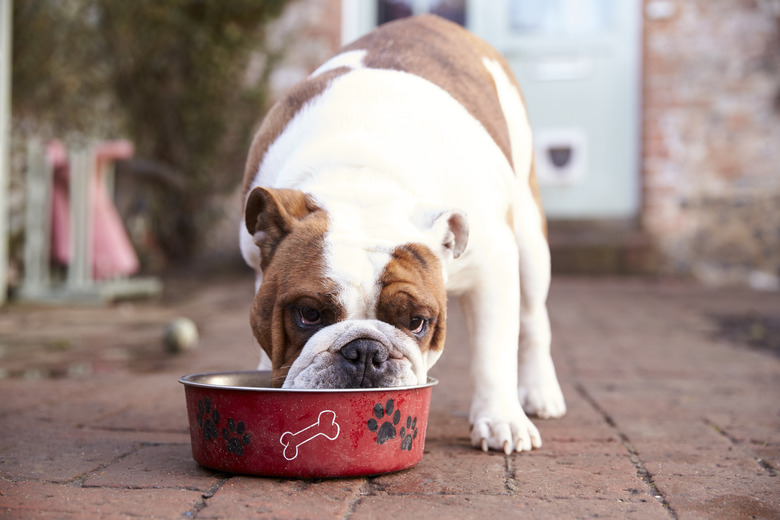Why Isn't My New Dog Eating Anything?
If you've ever brought a new dog home, you may be familiar with this scenario: You're beyond excited to start a life with your new companion, only she doesn't seem to be quite as thrilled with her homecoming.
Maybe she's shy and not up for immediate cuddles on the couch, or maybe she couldn't care less about that box of toys you so thoughtfully placed right by her new bed. Some dogs won't even eat from their own bowl for the first few months after arriving home, but why does that happen? Furthermore, what can you do about it?
Loss of appetite in dogs
Loss of appetite in dogs
Bringing a new dog home can be one of the most exciting times in a person's life. You've likely spent months considering your choice, searching for that perfect companion, and preparing your place with all the welcome-home essentials like bedding, toys, and food.
But what about your new dog? To him, the first couple of days of this big new change might feel scary and uncertain, especially if he's been in a transitional state for any amount of time. This is something most new dog owners fail to consider, but it's a common issue for many.
The good news is, it's almost always something that can be overcome. Preventive Vet assures new pet owners that a common reason your new family member may not be eating could be a simple case of stress. Whether your dog is just a young puppy you purchased from a breeder or an adult who came from a shelter or rescue, most dogs will require a little time getting adjusted to their new environment.
For some dogs, this settling in period may involve limiting food on their own behalf. You should also create eating habits or routines, such as eating at the same times each day. Typically, a dog likes to have a routine, so try to avoid moving your dog's food and water bowls once you have picked a spot.
The dog is getting settled
The dog is getting settled
Dogs crave structure, according to The Kennel Club, so most will begin to relax once they get the hang of what their new life will entail from day-to-day. Just like people, however, a dog's adjustment period will vary from dog to dog — some dogs will get back on an eating schedule in a matter of days, while others may take weeks to get back on track. If your dog isn't eating because of stress, she will likely come around as soon as she's sure that she's in a safe place and surrounded by people she can count on.
If you are certain it's stress that's got your dog's lower food intake, there are a few measures you can take to make sure she gets those daily calories. Hanging around your dog's food bowl during mealtime or even hand feeding are common moves that many people use to get their dogs acclimated to home life.
Alternatively, if you notice that your dog is particularly happy in a certain area of the home, or enjoys partaking in a certain activity, try giving her kibble in that area or during that time to help her associate food with positive experiences.
It might be medical conditions
It might be medical conditions
While most dog refusals to eat can be chalked up to unfamiliarity and stress, you'll want to be certain that it's just a case of nerves before waiting for your dog to come around. Medical issues like liver disease, kidney failure, or even cancer can suppress a dog's appetite. If these serious illnesses are the cause of your dog's change in eating habits, chances are there will be other symptoms too, such as not drinking water.
Also, pain in places like the stomach, throat, or mouth can make eating too uncomfortable to bear, and may also contribute to a loss of appetite in dogs. No matter where you brought your new dog home from, it's always important to pay a visit to a veterinarian in your area for an appointment that includes a physical exam, blood work, and a close look at his teeth and gums which may be hiding dental problems like gingivitis
Vaccinations can also cause a healthy dog to lose its appetite, says Ponderosa Vet Clinic, as can a change of medication — either a new medication or starting one — because they can cause an upset stomach or make them feel sleepy and lethargic.
You might have a picky eater
You might have a picky eater
If it isn't nerves or a physical ailment that's got your dog down, you may just have a picky eater on your hands. Before bringing your new dog home, find out what type of food she was eating and slowly transition her to a new diet if you wish to make that change.
If your dog is experiencing symptoms like irritated skin or trouble breathing, the underlying issue may be that she is allergic to the dog food you're feeding her and may require an allergy test to find the right fit for her needs. Experiment with wet food and dry options and avoid feeding a dog human food, which can have additives and preservatives that cause problems.
Some dogs avoid eating new food, but you can make a new dry food more appealing by pouring chicken broth or another tasty liquid over it. Try a wet canned food, which often has a more appealing taste and texture to dogs than dry bits.
If your schedule changes, don't be surprised if that influences your dog's eating habits. Because dogs are pack animals, it isn't uncommon for them to wait for you to come home to eat.

